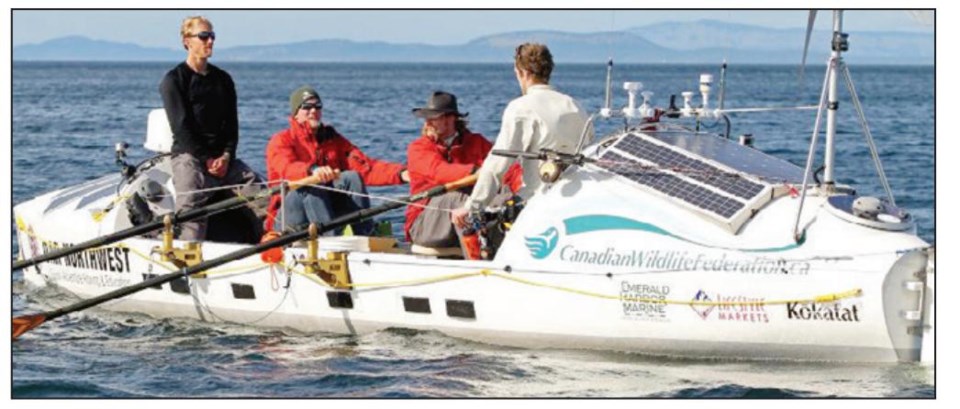Whether it's winning an Olympic gold medal or crossing the Atlantic Ocean in a rowboat, Adam Kreek believes in the power of goals to inspire people and change lives.
"Having big goals in our life, I think, is healthy," he said. "You see people who don't have goals and they're very unhappy.
"We need to have something that we can aspire to."
The Canadian Olympian will be putting that belief to the test later this year when he and three other men attempt to row from Dakar, Senegal, to Miami, Florida, in a 29-foot boat.
The Canadian Wildlife Federation Africa to Americas Expedition departs in late December and could be at sea for up to 100 days without a support boat.
Kreek, who won a gold medal in men's eights rowing at the 2008 Olympics in Beijing, began planning the trip three years ago, in part, as way to inspire young people to seek adventure and get outdoors.
"I'm keen that everybody should pursue adventure in their life and live that as a lifestyle and have adventure as their vacation goal," he said.
"Instead of going to Vegas and drinking your face off, why not decide that you're going to climb Mount Kilimanjaro?"
Kreek, 31, and his fellow rowers - Markus Pukonen of Tofino, and Jordan Hanssen and Pat Fleming, both of Seattle - have teamed with the University of Victoria, the University of Washington and other institutions to conduct research during the expedition.
The boat will be equipped with a satellite phone, GPS tracking and research equipment powered by a wind turbine and solar panels. A broad spectrum hydrophone will record underwater sounds of marine life, while sensors will measure the ocean's temperature, density, carbon dioxide levels and acidity.
"It's rare to be able to get this type of data set," said Greg Spooner of OAR Northwest, the expedition's mission control person.
"Now you have this perfect vehicle that's going at a walker's pace all the way across the ocean that will pick up data every 15 seconds at very high resolution. That will be sent back automatically without us having to do a thing."
The Centre for Sleep and Human Performance in Calgary will be analyzing the rowers' circadian rhythms under the effects of physical stress and an erratic sleep schedule.
The rowers will sleep in shifts of one, two and four hours in order to power the boat 24 hours a day.
Lifestyle Markets in Victoria is supplying each member of the crew with up to 6,000 calories of organic food and supplements a day.
Kreek is hoping that teachers will use the expedition as both a teaching tool and a way to inspire children to pursue their own goals and adventures.
"As individuals, we protect what we know," he said.
"The more people that get outside and experience it, the more we'll have an ethos of conservation. The more people stay within the concrete walls of the city, the less interest there is for global conservation issues."
Quadra Elementary principal Marilyn Campbell said her Grade 5 class followed Kreek and his team when they circumnavigated Vancouver Island this year.
Students mapped the expedition's progress as part of their studies of B.C. and Canada.
They also wrote to the rowers on a blog to ask questions, and Kreek contacted the class by radiophone to provide an update on the journey.
Campbell said the expedition brought many of the concepts to life for students.
"It's real," she said. "You're not just reading it out of a book."
She said Kreek also challenged the students to have their own adventures, so the class went dragon boating, which none of them had ever done before.
"It certainly gets some people's minds going [about] the possibilities of what if," she said.
AFRICA TO THE AMERICAS EXPEDITION
? Distance from Dakar, Senegal, to Miami: about 6,700 kilometres
? Amount of food on board: 250 kilograms
? Estimated crossing time: 60 to 100 days
? Length of rowboat: 29 feet
? Hours per day that boat will be rowed: 24
? Length of cabin where rowers will sleep in shifts: 8 feet
? Time it took for team's practice run around the Island: 3 weeks
? Money raised to fund the expedition: $300,000
? Years spent planning: 3
The team's progress will be tracked online at OARnorthwest.org.
lkines@timescolonist.com



